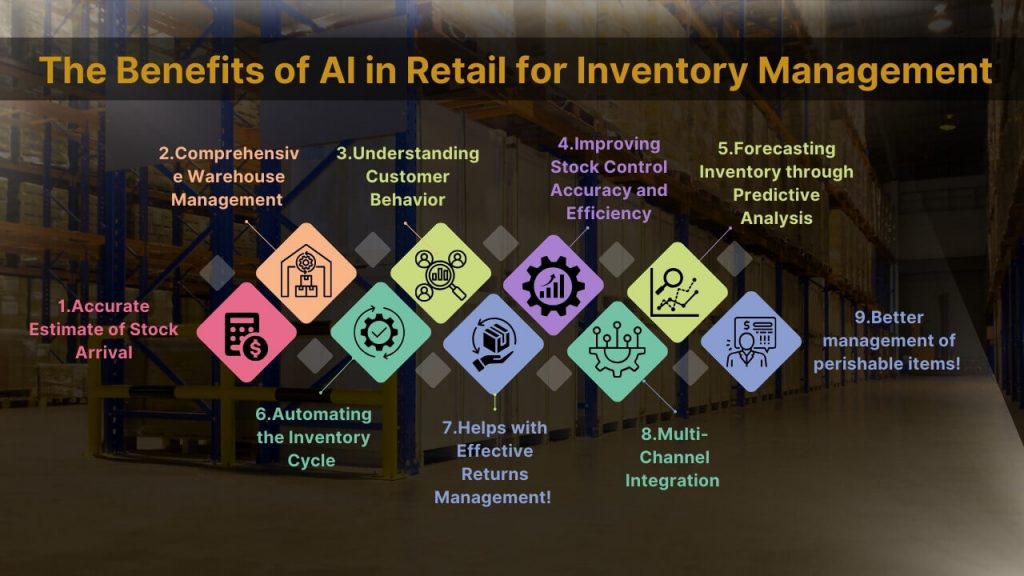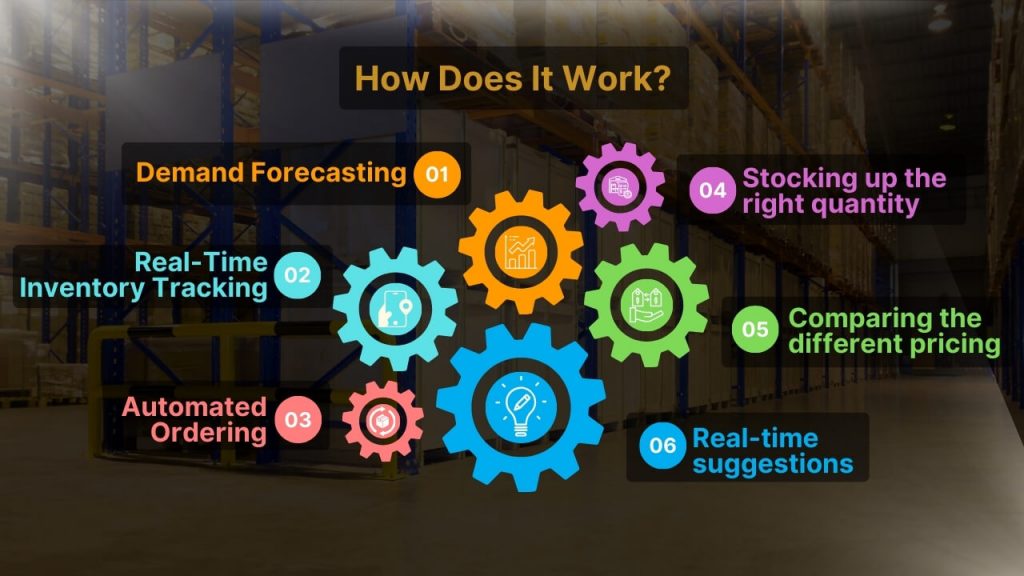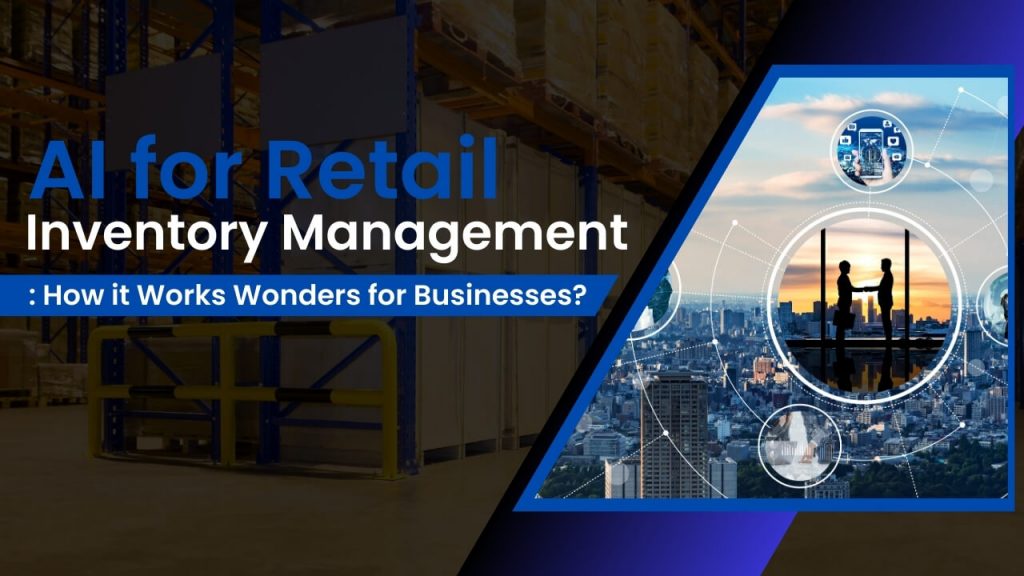Introduction
Artificial intelligence, which was once a mainstay of science fiction films, is now a reality in business.
Thank you for reading this post, don't forget to subscribe!A few years ago, it would have seemed unfeasible and unreal to imagine artificial intelligence systems capable of self-learning, thinking, solving problems, organizing data, and performing tasks similar to those of humans. As AI develops, though, things are starting to shift.
With AI the data is available at the fingertips and changes things for businesses across industries. One such industry is Retail and its problems with effective inventory management.
Chiefly, artificial intelligence inventory management software can automate data ingestion, transformation, analytics, and data visualization to streamline inventory management processes for retail businesses.
Did you know, that AI-enabled supply chain management can optimize Inventory levels optimized by 35%
The days of chasing employees for updates using pen and paper are over. AI improves inventory management, allowing you to reallocate resources and focus on other important business areas.
This article will look at how AI is changing the retail industry and the effective ways to streamline inventory management in retail.
AI is Streamlining Inventory Management in Retail.
AI will undoubtedly have an impact on retail, just like it will on other areas of our lives. It is revolutionizing the entire purchasing procedure, from customization and customer service to inventory management.
With AI taking the place of traditional reliance on spreadsheets and intuition, the retail business is totally changing. According to The Economist, warehouse automation is becoming more and more popular, and supply chains are becoming more complex.
It also highlights the economic value that businesses would receive from utilizing AI in supply chains and manufacturing is expected to range from $1.3 trillion to $2 trillion yearly. In order to maximize resources and increase revenues, this trend forces retail businesses of all sizes to implement AI for inventory management.
A Mordor Intelligence analysis projects that the retail AI industry will reach USD 29.45 billion in 2028, growing at a compound annual growth rate of 32.17% from USD 7.3 billion in 2023.
What’s the good news? AI is no longer reserved for very large tech companies! AI can help organizations of all sizes optimize efficiency in their inventory management procedures because it is becoming more and more accessible and affordable.
The Benefits of AI in Retail for Inventory Management
AI offers numerous benefits to retail businesses for inventory management, revolutionizing how they handle stock levels, streamline operations, and meet customer demands. By leveraging AI tools, retailers can achieve improved efficiency, accuracy, and profitability in managing their inventory across various sales channels.
Let’s dig in to find out how it works, how it benefits the businesses and how leading retailers are leveraging Ai for their benefit.

Accurate Estimate of Stock Arrival
Knowing the number and location of available-to-promise inventory is crucial for organizations that want to meet and exceed customer expectations. In this highly competitive age, the ability to convey the projected arrival time of a product to clients is becoming increasingly valuable and necessary.
And, AI does exactly the same. It keeps everything stored and helps you track the inventory quantity, its arrival, and everything around it in real-time.
A retail giant like Amazon is using AI to stay on top of inventory, help their customers with estimated delivery times and provide real-time tracking windows as well. This will help guarantee that each fulfillment decision is in line with the company’s priorities, whether they be cost or time.
The best AI tools will integrate everything to keep track of countless inputs to improve the accuracy of these models. This accurate tracking and updates not only ensures customer satisfaction but also reduces costs and boosts profits.
Comprehensive Warehouse Management
AI inventory management simplifies, streamlines, and focuses on warehouse management efforts. Streamlining and streamlining warehouse management operations reduces the likelihood of human mistakes while allowing employees to be deployed elsewhere.
AI can enhance warehouse management in a number of ways, including:
- Better communication: Automated AI systems can provide accurate information more quickly than human operators.
- On-the-go updates: Implementing cloud-based devices enables immediate and on-the-go upgrades.
- Streamlining Logistics: Artificial intelligence (AI) can now reduce processing time and human error by optimizing logistics activities like counting pallets or identifying the necessary equipment for staff.
- Demand Forecasting: AI algorithms can analyze historical sales data, market trends, and other external factors (like seasonality or economic conditions) to predict future product demand. This helps in maintaining optimal inventory levels and reducing overstock and stock outs.
- Automated Inventory Tracking: AI-powered systems can use RFID tags, IoT sensors, and computer vision to track inventory in real-time. This minimizes human error, ensures accurate inventory counts, and allows for quick identification of misplaced items.
- Warehouse Optimization: AI can analyze warehouse layout and item-picking patterns to optimize the storage of products. It can suggest the best locations for items based on their demand frequency, reducing the time and cost of order picking.
All these warehouse management improvements help you better manage your inventory in your retail business while leading to saving crucial business resources and improving business productivity.
Understanding Customer Behavior
Understanding how customers move through a retail store and what they purchase, when they purchase, how they purchase and other relevant things are vital for good inventory management. Retailers can effectively leverage this data to streamline store operations and inventory optimization.
With the data, customers can decide how much stock to have, how many staff to schedule, and how to arrange the store layout. This helps them serve customers more effectively. One of the ways to seamlessly collect the data and use it is through AI.
For example, with the AI data platform in place, when it is integrated with the POS system, you can track the customer analytics. It includes what are the best-selling items, the most busy hours, who are returning numbers and other things around it.
Retailers can use this information to make well-informed decisions on inventory control. They keep an eye on popular items during peak hours, know which ones to replenish first, and can help avoid having too much inventory in less visited sections of the store.
AI is transforming how retailers estimate client demand. Machine learning forecasting generates predictions for efficient inventory management by utilizing information from social media, current trends, historical sales, and current trends.
Let’s Understand how Retail Giant Zara is leveraging AI for Inventory Management!
Retail behemoths such as Zara are utilizing AI forecasting to gather customer data for optimal inventory management and to fine-tune their overall business strategies. Zara can get significant data throughout the process by coordinating everything from design to shipping. They can use this information to detect inventory inefficiencies, identify successful items, and make accurate projections.
Improving Stock Control Accuracy and Efficiency
One of the most significant advantages of artificial intelligence in inventory management is its capacity to improve stock control accuracy and efficiency. Artificial intelligence (AI) systems can autonomously reorder products or modify stock allocations by analyzing real-time data, including sales, returns, and inventory levels.
By automating these procedures, merchants may reduce human error while maintaining ideal inventory levels. AI can also facilitate the process of stocktaking by making it more efficient. Traditionally, stocktaking included manual inventory counting and recording, which was both time-consuming and error-prone.
Retailers may use AI to automate stocktaking by leveraging technologies like computer vision and barcode scanning. AI can rapidly recognize and record inventory items with no human intervention, which enhances accuracy while also saving time.
Another way AI improves stock control accuracy is by lowering the possibility of stock inconsistencies. AI algorithms may continuously monitor levels of stock and compare them to sales data, ensuring that the recorded stock is consistent with the actual stock. This allows merchants to quickly identify and address any difficulties, avoiding potential losses due to stock inconsistencies.
Forecasting Inventory through Predictive Analysis
AI-powered predictive analysis is a game changer in inventory management. By evaluating past data and combining external factors such as seasonality, promotions, and even weather patterns, AI algorithms can estimate demand with substantially higher accuracy. This helps retailers make the best possible purchasing selections when it comes to inventory and stay steer clear of overstocking or stockouts.
In addition, AI can deliver more precise inventory estimates by accounting for a variety of customer behavior patterns and market trends.
For example, AI tools can examine social media trends and customer feedback to detect upcoming product trends or shifts in consumer preferences. This way, retailers can stay ahead of the competition and can provide the best and trendy products for their customers while reducing expenses and losses when it comes to inventory procurement and optimization.
Walmart leveraging AI for forecasting & predictive intelligence!
Big retailers like Walmart are using AI-powered predictive analysis to improve their inventory management. By looking at past sales data along with factors like seasonality, promotions, and weather, Walmart’s AI can accurately predict demand. This helps them make better decisions about what to buy, avoiding both overstocking and stockouts.
Walmart’s AI also analyzes customer behavior and market trends to provide precise inventory estimates. For example, it looks at social media trends and customer feedback to spot new product trends and changes in consumer preferences. This allows Walmart to stay ahead of the competition by stocking the latest and most popular products.
Automating the Inventory Cycle
AI helps retail businesses automate their inventory cycle by leveraging advanced algorithms and real-time data analytics. This technology optimizes the entire process of inventory management, from forecasting demand to restocking shelves.
By automating these tasks, AI reduces human error, increases efficiency, and ensures that the right products are available at the right time, which ultimately enhances customer satisfaction and reduces operational costs.
How Does It Work?

- Demand Forecasting: AI predicts future product demand based on historical data, market trends, and external factors.
- Real-Time Inventory Tracking: IoT sensors and RFID tags provide continuous, accurate inventory data.
- Automated Ordering: When inventory levels drop below a certain threshold, AI systems automatically place restocking orders.
- Stocking up the right quantity: As per the requirements, the AI will help customers predict the right type and quantity for the inventory.
- Comparing the different pricing: The AI tool can also help retailers analyze pricing and quality from different suppliers to help you choose the right one.
- Real-time suggestions: The best AI retail data tools gives you real-time suggestions on what’s best for your restaurant when it comes to inventory.
As you know, choosing the right quality products in the right quantity, at the right place is quite important and AI makes it possible in an easy and efficient manner.
Amazon leverages AI to automate its inventory cycle!
Amazon utilizes AI extensively to automate its inventory cycle, ensuring efficiency and accuracy throughout its operations. AI predicts product demand using advanced machine learning models followed by real-time inventory tracking as well.
When stock levels are low, AI systems automatically place restocking orders, ensuring timely replenishment from suppliers. This comprehensive use of AI allows Amazon to meet customer demands swiftly and maintain a seamless supply chain.
Helps with Effective Returns Management!
For retail businesses, tracking, checking and managing returns is kind of a pain and is also quite challenging as well. So, retail businesses need to do everything right to ensure efficient management. Well, AI comes to rescue and it helps retailers manage returns more effectively, ensuring accurate inventory management and enhancing overall efficiency.
Let’s find out how?
- By analyzing return patterns, AI can identify common issues such as product defects, incorrect sizing, or customer dissatisfaction.
- AI systems streamline the return process by automating tasks like generating return labels, updating inventory records, and processing refunds, which reduces the manual workload and speeds up the entire process.
- Additionally, AI employs advanced technologies like image recognition and machine learning to inspect returned items for defects.
With all this data in place, retail businesses can analyze the most common problem and work on it to solve it – which helps in decreasing returns, enhancing customer satisfaction, reducing operational costs and boosting profitability.
Multi-Channel Integration
AI integrates inventory data across online stores, physical retail locations, and mobile platforms, providing a unified view of inventory to the retail store owners and helps with its effective Inventory management.
This end-to-end integration and comprehensive overview ensures efficient management, reduced discrepancies, and improved customer satisfaction with the accurate product availability.
AI consolidates inventory data into a centralized database, updating it in real-time as products are sold, returned, or restocked. Automated synchronization keeps inventory counts consistent across all channels. It ensures that all the products are available for the customer regardless of the channel.
AI tools enhance the customer experience by allowing them to check product availability, choose preferred purchase methods, and receive accurate delivery estimates. Additionally, AI helps identify and fix inventory discrepancies and dynamically adjusts inventory levels based on real-time sales data, seasonal trends, and promotions.
Better management of perishable items!
If you are selling perishable items in your retail store, then its effective management is quite important. You can’t sell expired products to your customers. At the same time, you don’t want to throw your products into the bin.
AI significantly enhances the management of perishable goods by monitoring their shelf life and optimizing stock levels, thereby reducing waste and ensuring that fresh products are consistently available.
- AI employs IoT sensors and RFID tags to track the condition and location of perishable items in real-time, monitoring factors such as temperature and humidity that affect their shelf life.
- Advanced algorithms analyze this data to predict the remaining shelf life of each item, identifying products that need to be sold or used quickly.
- By forecasting future demand based on historical sales data and seasonal trends and helps with the automated stock replenishment to maintain optimal inventory levels, avoiding both overstock, stockouts and availability of the fresh products.
- AI also optimizes stock rotation by recommending the arrangement of items so that older stock is sold first, minimizing spoilage.
- Additionally, dynamic pricing strategies suggested by AI can accelerate the sale of items nearing expiration, further reducing waste.
To Conclude
We’ve covered how AI can greatly benefit retail stores by optimizing inventory management—improving efficiency, reducing errors, enhancing customer satisfaction, and cutting down on waste. But it’s important to choose the right AI tool tailored to your specific needs.
Take the time to research and find a platform that seamlessly integrates with your existing systems, offers features like real-time tracking and demand forecasting, and supports your growth plans.
If you’re ready to explore how AI can transform your retail operations, book a free demo today. See firsthand how our AI solution can streamline your inventory processes and boost overall performance.
Making the right choice now can lead to smarter business decisions and better outcomes for your retail business. Let’s start optimizing your inventory management with AI—schedule your demo and get started on the path to streamlined inventory management, business operations and customer satisfaction.
